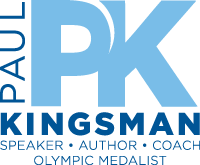Distraction-Proof® Advisor Ideas
Business-building ideas and advice to move you forward faster.
Don’t Be Too Quick to Judge (Distraction-Proof Advisor Idea Video #164)
Share this:
Body language isn’t always clear. Sometimes people look unhappy or disengaged, but they’re really thinking deeply about your words. But sometimes people’s negative body language really is communicating displeasure with what you’ve said. When the latter happens,
- rather than beating yourself up, take stock of what happened.
- identify what you should have said, or when you should have simply listened rather than saying anything at all.
- practice what you want to say so you’re ready when the next opportunity comes.
Don’t rush to judge yourself too quickly or too harshly.
…
We hear a lot about reading body language and why that’s so important, especially when we’re with a prospect or a client, and we should be aware of that. It is important. But don’t rush to be too harsh on yourself during that process if you’re watching that person seemingly sit back, or frown a little, or take on a posture that might seem dismissive.
You don’t know exactly what they are thinking. Now, obviously, during the course of the conversation you’d love to see that body language adjust somewhat, but don’t get hard on yourself, or too tough on yourself, and then, thinking about that, let the rest of the meeting just go out the window.
I remember a number of times when I’ve been delivering a sermon at church, for instance, and had somebody in the front row sitting with their arms folded, scowling all the way through. I’ve thought the worst while I was going through that, only to have them come up a week later and say that was exactly what they needed to hear.
I’ve had engagements with financial service firms where I’ve had advisors in the front row often look like they’ve checked out, again just frowning at me as though they are waiting for this to be over. They’re the first ones who then come up after I’ve finished speaking and say that point was exactly what they needed to hear, and they were just dialing in with how they then needed to take that advice back to their office and put that into practice. So, don’t get too hard on yourself too soon.
Sometimes, however, you are going to say the wrong thing. I was coaching a client last week who mentioned that: he said he knew as soon as he had mentioned the verbiage the way that he delivered it, he lost one of the spouses. They just checked out, and he was unable to get the meeting back on track. Sometimes that’s going to happen.
When that does happen,
- Don’t beat yourself up unnecessarily about it. Take stock of what happened and what you said.
- Then, learn from that. Write down the words that would have been more appropriate to say or, oftentimes, the words that probably were not appropriate to say and you should have just listened.
- Practice it the next time. You’re going to get a time that comes along – another opportunity – that come along sooner than you think to really dial this in and get it just right.
As an Olympic athlete, when things went wrong on the day, we didn’t have the next Olympic Games three days away. We had to wait a whole four years before we had the chance to perform again. As advisors, chances are, we’re going to have the next time to perform coming along within the next three or four days, at least. Don’t get down about it. Relish the opportunity that’s coming along soon, and then understand how you’re going to deliver a phenomenal performance and hit it exactly like you wanted to.
I look forward to bringing you another Distraction-Proof Advisor Idea next week.
For more Distraction-Proof Advisor videos, visit my blog directory page to link to more ideas to help you gain control, work smarter and succeed sooner.
Make sure you don’t miss any of my weekly video tips to help you focus on what really matters in your business. Subscribe to have notifications of postings delivered directly to your inbox.
- Post Categories
- Advisor Ideas Video
- Communication
- Perseverance
- Prospecting
Paul Kingsman
Paul Kingsman is a sought-after expert on how to be distraction-proof. Through his speaking, writing, and coaching, he teaches financial services professionals how to maintain focus and take practical daily steps to successfully grow their businesses and achieve outstanding long-term results. To find out more about Paul and how he can equip you or your team to achieve your own outstanding results, visit PaulKingsman.com.
1 Comment
Leave a Comment Cancel Reply
Search
Recent Posts
- When Referrals Aren’t a Good Fit (Distraction-Proof Advisor Idea Video #350)
- Make the Most of Reconnecting (Distraction-Proof Advisor Idea Video #349)
- Two More Communication Crutches To Avoid (Distraction-Proof Advisor Idea Video #348)
- Olympic Lesson: How to Make Big Goals Reality (Distraction-Proof Advisor Idea Video #347)
- Olympic Lesson: Make Time To Give Back (Distraction-Proof Advisor Idea Video #346)
Archives
Client Testimonials
"2021 has been a great year for my business, and a lot of that was because of what I learned from you, Paul. You've been an advisor, so you get it! Thank you so much for your invaluable transformative coaching and advice!"
Michelle Glass, Glass Financial Advisors

[…] Don’t Be Too Quick to Judge (Distraction-Proof Advisor Idea Video #164) via Paul […]